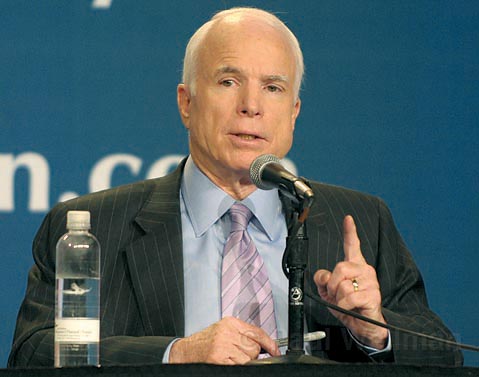McCain, Schwarzenegger Tout Energy Independence
Capps Disses Effort as 'Fred Flintstone Energy Plan'

With air conditioners humming on Arctic overdrive, Republican presidential candidate John McCain took to the stage at Santa Barbara’s Museum of Natural History to host a high-powered panel discussion Tuesday morning, June 24, on his plans to achieve energy independence. Flanked by California Governor Arnold Schwarzenegger and former CIA Director James Woolsey-among others-McCain stressed that the federal government needed to lead the charge to promote clean coal, nuclear power plants, and a host of alternative energy technologies that would effectively wean the United States from its dependence on foreign oil.
Unlike most McCain events, there was no give-and-take with the audience or the media. Nor was there any verbal jousting with the protestors out front objecting to McCain’s controversial proposal to lift the moratorium on new oil leasing off the coasts of California and New England, and in the Gulf of Mexico. That moratorium has been in effect since 1981, partially in response to Santa Barbara’s cataclysmic oil spill of 1969. Conspicuously, McCain made no direct reference to opening up the Santa Barbara Channel-and the entire Pacific coast-to further oil leases, making more oblique references instead to developing “America’s own vast reserves of oil and natural gas.” Even though Schwarzenegger-who is endorsing McCain-publicly disagreed with McCain last week over the leasing moratorium, he never broached the sensitive subject, either.
That task would fall to panelist Michael Feeney, now with the Santa Barbara Land Trust, who during the 1980s played a major role in beating back the oil industry’s sustained push to develop off the Santa Barbara coast. If the coastline were reopened to new oil leasing, Feeney warned it would take “12, 15, 20 years” before this would translate into new production. “That won’t impact the price of gas anytime soon,” Feeney said. McCain let Feeney’s criticism slide without comment, preferring to engage in a polite but spirited back-and-forth on the subject of nuclear energy. There is no safe way to dispose of the nuclear wastes generated by the 25 new nuclear power plants McCain wants to see built, Feeney said. McCain countered that the French generate nearly 80 percent of their electricity from nukes, and that the U.S. Navy had been using nuclear powered vessels for 60 years without incident. “It’s a NIMBY problem,” McCain said, not a technological one. “I don’t know how they’re doing it in Europe, but we’re not dealing with it successfully in the U.S.,” Feeney responded.
Perhaps the sharpest criticism of McCain’s proposal to open the California coast to further oil leases came from Santa Barbara Congressmember Lois Capps, who was not on hand to deliver it personally. “Senator McCain wants to keep America on a Fred Flintstone energy plan when we need to move forward with an energy policy for the future,” she declared prior to the event. Specifically, Capps has called for the elimination of about $16 billion in tax breaks currently enjoyed by the oil industry and transferring those to the solar, wind, and bio-mass industries. She also accused the oil companies of “sitting on” nearly 70,000 acres of federal offshore leases and not developing them. “They like the high prices,” Capps said. She said she favors legislation that would penalize oil companies that did not develop their leases in a timely fashion. She also supports a bill that would bring the oil commodities market under federal regulation.
Capps charged McCain’s new energy plan “sure looks a heck of a lot like the old Bush-Cheney plan.” But there are key differences as well. For starters, McCain made it clear Tuesday that he regards as sound the scientific evidence supporting global warming. He outlined a market-driven cap-and-trade program to reduce carbon emissions to 1990 levels by the year 2050. He vowed to set aside $2 billion a year in tax credits for the research and development of clean coal over the next 15 years. He proposed tax credits of up to $5,000 for people buying zero-emission vehicles. And McCain said he’d offer $300 million to the company that can develop the best new car battery. Former CIA chief and panelist James Woolsey noted that no new power plants would be required if 70 percent of California’s cars were electric powered.
Panelist Matthew Tirell, of UCSB’s Institute of Energy Efficiency, said conservation will become ever more critical over the next 20 years, when world energy consumption is predicted to double. With gas hovering at $5 a gallon, McCain said the time has come “to shake off years of partisan paralysis” and pledged to work with Democrats to get something done. “I will put America first and my own party second,” McCain promised.



